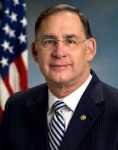- Supporting Americans with Disabilities and Their Families (3/6/25)
- Standing Up for Sportsmenís Access and Safety (2/20/25)
- Bringing Farm Country Voices to Washington (2/12/25)
- A New Front in the Fight Against Prostate Cancer (2/6/25)
- Taking Action to Reverse Immigration Failures and Protect Communities (1/30/25)
- Setting the Agenda for 2025 (1/22/25)
- Making progress for Arkansasís water infrastructure (1/16/25)
Modernizing Federal Investment for†Economic Development in Arkansas Communities
Investments by the U.S. Economic Development Administration (EDA) in Arkansas are helping promote growth and progress that improve quality of life across our state. Already this year, grants to educate healthcare professionals in Newport, water infrastructure improvements in Trumann and tornado recovery efforts in Jonesboro have been awarded. I’m proud to advocate for these projects and enhancements to EDA so it can continue to boost economic success in Natural State communities.
The EDA has helped support a wide range of economic development projects since it was created in 1965, yet it’s been nearly 20 years since Congress reauthorized EDA. We must use this opportunity to update the agency’s programs and ensure it has the tools and resources to achieve its mission. I’m championing a legislative initiative to modernize and strengthen the vital services it provides.
My colleagues on the Senate Environment and Public Works (EPW) Committee and I recently advanced the Economic Development Reauthorization Act of 2024. This legislation would reform some of the agency’s programs and authorize activities such as workforce development and disaster assistance.
I’m pleased this legislation includes a measure I advocated to specify EDA’s role in economic recovery for communities impacted by natural disasters.
Arkansans are too familiar with the devastation caused by Mother Nature. Each time our state has been impacted by weather events, the EDA’s leadership has been crucial to repairing, restoring and rebuilding in the aftermath. That’s why we need to formally designate an Office of Disaster Recovering and Resilience within the EDA, which would enable us to harness the institutional knowledge that can help expedite resources on the ground where the need is urgent.
Clearly defining its role in disasters will improve the federal response and long-term economic outcome for communities, families and businesses picking up the pieces.
The bipartisan legislation was created with stakeholder input from across the country. In his testimony to members of the EPW Committee last year, Little Rock Port Authority Executive Director Bryan Day shared how infrastructure investments made with EDA funds over the past two decades have attracted businesses to the port and directly resulted in more than $2.5 billion in capital investment in addition to the creation of more than 5,000 jobs.
We want more communities to compete for these funds and experience the same positive results. In order to accomplish this, we need to make the application process less tedious. Small, rural towns often struggle with the lack of expertise and manpower to dedicate the significant time needed to complete the paperwork. Keeping the process simple will help remedy that issue and increase participation.
That feedback is why this bill includes updates to the application process as well as affords technical assistance to applicants. These commonsense measures will open the door to more communities seeking funding for workforce training and infrastructure enhancements.
It’s time we reauthorize this program and modernize how the agency operates so we can strengthen its ability to respond to evolving challenges, meet changing economic conditions and continue to deliver critical resources to improve local economies. I look forward to applauding future grant announcements and congratulating Arkansas communities for their success in attracting these economic investments.
Posting a comment requires free registration:
- If you already have an account, follow this link to login
- Otherwise, follow this link to register

